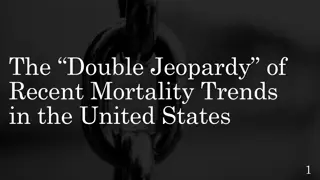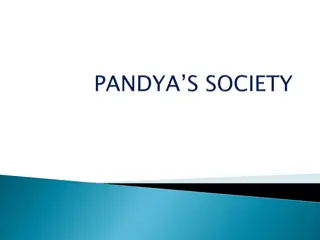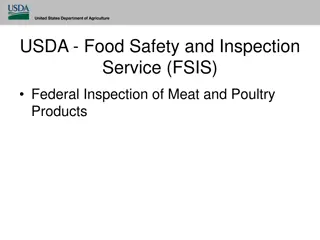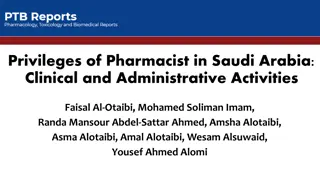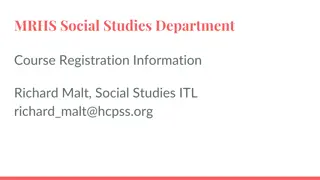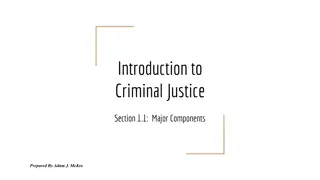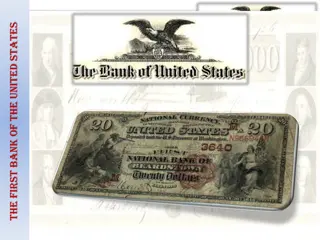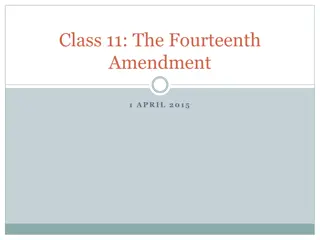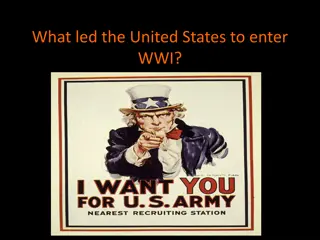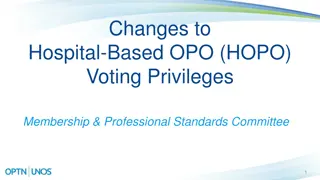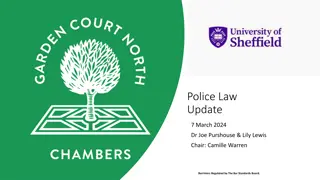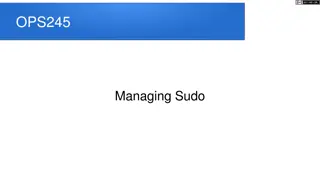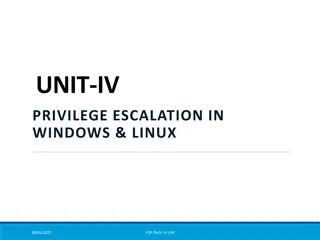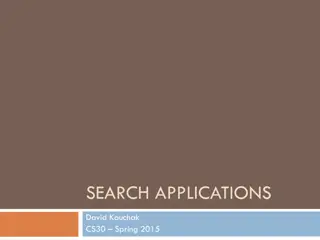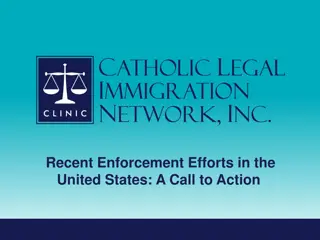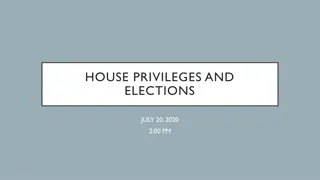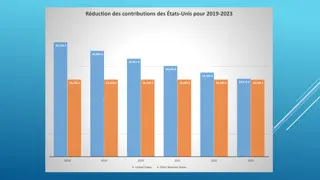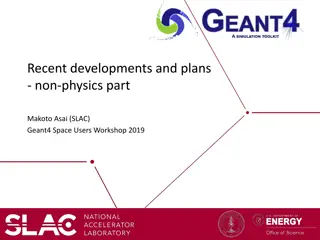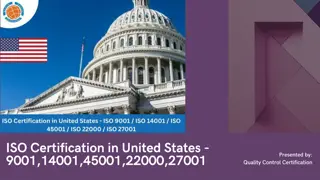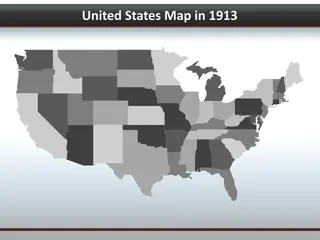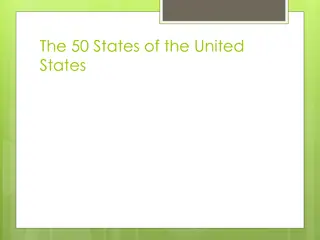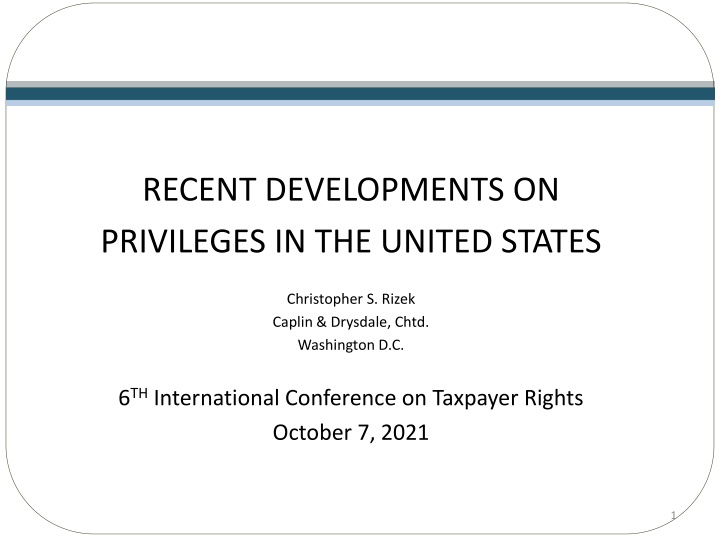
RECENT DEVELOPMENTS ON PRIVILEGES IN THE UNITED STATES
This presentation delves into recent cases and developments related to privileges in the United States, covering topics such as confidentiality, attorney-client privilege, and more. Learn about the basics of protections, recent legal issues, and the importance of maintaining client confidences in legal and accounting professions.
Download Presentation

Please find below an Image/Link to download the presentation.
The content on the website is provided AS IS for your information and personal use only. It may not be sold, licensed, or shared on other websites without obtaining consent from the author. If you encounter any issues during the download, it is possible that the publisher has removed the file from their server.
You are allowed to download the files provided on this website for personal or commercial use, subject to the condition that they are used lawfully. All files are the property of their respective owners.
The content on the website is provided AS IS for your information and personal use only. It may not be sold, licensed, or shared on other websites without obtaining consent from the author.
E N D
Presentation Transcript
RECENT DEVELOPMENTS ON PRIVILEGES IN THE UNITED STATES Christopher S. Rizek Caplin & Drysdale, Chtd. Washington D.C. 6TH International Conference on Taxpayer Rights October 7, 2021 1
Overview Basics of the protections in the U.S. Confidentiality Privileges Recent cases/developments on privileges Discovery and John Doe summonses to law firms Return preparation Kovel issues Business advice Internal investigations 2
Basics: Confidentiality ABA Model Rule 1.6 imposes a broad obligation on lawyers to maintain client confidences. AICPA has a similar requirement for CPAs in its Code of Professional Conduct 1.700.001. There is no confidentiality requirement in Cir. 230 for tax practitioners. But IRC 7216 imposes many restrictions on use of information if you are a return preparer. 3
Basics: attorney-client privilege Attorney-client privilege is part of a longstanding policy protecting certain communications from discovery or use as evidence. The policy is to encourage full and frank communication between attorney and clients to promote broader public interests in the observance of law and administration of justice. Upjohn Co. v. U.S., 439 U.S. 383 (1981). 4
Basics: attorney-client privilege The classic formulation of the attorney-client privilege in the U.S. is from Wigmore: (1) Where legal advice of any kind is sought (2) from a professional legal adviser in his capacity as such, (3) the communications relating to that purpose, (4) made in confidence (5) by the client, (6) are at his instance permanently protected (7) from disclosure by himself or by the legal adviser, (8) except the protection be waived. 8 Wigmore on Evidence 2292 (McNaughton rev. 1961) 5
Basics: attorney-client privilege Note: There are cases on all of these elements. Exceptions: crime-fraud, non-legal purposes, waiver, etc. Although some states have codified it, it is not a rule of evidence in federal courts. FRE 501 expressly says that the common law governs a claim of privilege unless an exception applies. It may be extended to non-lawyers who assist a lawyer in providing legal advice (e.g. investigators, accountants, translators, appraisers). US v. Kovel, 296 F.2d. 918 (2d Cir. 1961). 6
Basics: tax practitioner privilege There is no common-law privilege for accountant- client communications in the US, see U.S. v. Arthur Young & Co., 465 U.S. 805 (1984), although some states have statutory versions. Accounting firms sought parity with law firms to have privileged communications with clients. In 1998 Congress enacted legislation aimed at extending privilege to communications with Federally Authorized Tax Practitioners ( FATPs ). 7
Basics: tax practitioner privilege IRC 7525(a) states: (1) General rule. With respect to tax advice, the same common law protections of confidentiality which apply to a communication between a taxpayer and an attorney shall also apply to a communication between a taxpayer and any federally authorized tax practitioner to the extent the communication would be considered a privileged communication if it were between a taxpayer and an attorney. 8
Basics: tax practitioner privilege (2) Definitions. For purposes of this subsection (A) Federally authorized tax practitioner. The term federally authorized tax practitioner means any individual who is authorized under Federal law to practice before the [IRS] if such practice is subject to Federal regulation under [31 U.S.C. 330]. (B) Tax advice.The term tax advice means advice given by an individual with respect to a matter which is within the scope of the individual s authority to practice described in subparagraph (A). 9
Basics: tax practitioner privilege There are statutory limitations/exceptions: It applies only in noncriminal tax matters before the IRS and noncriminal tax proceedings in Federal court. IRC 7525(a)(2). Thus it does not apply in state proceedings, other non-tax federal proceedings, or criminal cases. It does not apply to any written communication with a FATP in connection with promotion of a tax shelter (as defined). IRC 7525(b). And once waived, it is waived for all purposes. 10
Basics: work product doctrine The work product doctrine derives from Hickman v. Taylor, 329 U.S. 495 (1947). It is now codified in Fed. R. Civ. Pro. 26(b)(3), and in Tax Court Rule 70(c)(3). It is not technically a privilege. It is grounded in the policy or concept of fairness to an opponent (in litigation), not based on the protection of confidential communications. Thus it can be overcome if there is a sufficient showing of need. 11
Basics: Waiver Privileges protect confidential communications, so privilege disappears if there is a disclosure outside of the privileged relationship. Note: work product is different. Generally disclosure waives only privilege with respect to the specific document or communication that is no longer confidential. But there s an exception if the disclosure is made for an affirmative use or purpose. Then all communications on the subject may become discoverable. 12
Recent issues: Discovery from lawyers When lawyers are targets of discovery, ordinarily much of the material is privileged. Non-legal correspondence, like engagement letters, bills, etc., is usually not privileged. A privilege log is routinely required. DOJ may use taint teams made up of DOJ employees not related to the matter. See https://www.justice.gov/jm/jm-9-13000-obtaining- evidence. Alternatively, special masters are often used for this purpose. 13
Recent issues: John Doe summonses There is a procedure for John Doe summons requests for information. IRC 7609(f). IRS has served such a summons on a law firm. Taylor Lohmeyer Law Firm PLLC v. United States, 957 F.3d 505 (5th Cir. 2020), cert. pending, No. 20- 1596 (S. Ct.). Because the law firm had previously advised a known client about use of offshore tax planning, IRS/DOJ asked for the identities of other clients for whom the same services had been performed. 14
Recent issues: John Doe summonses The IRS/DOJ has recently obtained John Doe summonses regarding crypto-currencies, served on many facilitators of such transactions. E.g., In the Matter of the Tax Liabilities of John Does, No. 20-MC-32 (D. Minn. Sept. 3, 2021); In the Matter of the Tax Liabilities of John Does, No. 21 MISC 424 (SDNY July 15, 2021). As yet, tax professional firms haven t been targeted, but the Taylor Lohmeyer case will have to be watched. 15
Recent issues: return preparation Communications regarding preparation of tax returns are frequently held not to be privileged. Theories for this include: That it s accounting, not legal work; That a return was never meant to be confidential; That privilege is waived when the return is filed. The tax practitioner privilege may not cover this activity, because of cases holding return preparation not to be practice before the IRS. 16
Recent issues: return preparation Trump v. Vance, No. 20A63 (S.Ct. Order Feb. 22, 2021). Permitted a subpoena to stand that sought 8 years worth of returns and supporting materials from accounting firm Mazars. 17
Recent issues: Kovel People v. Trump Org. et al., No. 451685/2020 (Dec. 15, 2020), enforced a subpoena for communications with an engineer, Ralph Mastromonaco, regarding development potential of a property. The Court held the Trump Org. had not proven that engaging the engineer was necessary so that the attorneys could render legal advice. Thus the communications were not privileged under Kovel. 18
Recent issues: business advice An earlier order in the same case, People v. Trump Org. et al., No. 451685/2020 (Supp. Order Jan. 29, 2021), enforced a subpoena for many documents from law firm Morgan Lewis. Many documents were communications addressing business tasks and decisions, not exchanges soliciting or rendering legal advice. E.g., discussions with an appraiser of property to establish value of a deduction; discussions regarding public relations aspects of the matter. And if third persons were present, then waived. 19
Recent issues: business advice In re Grand Jury, No. 21-55085 (9th Cir. Sept. 13, 2021). [A]ttorneys often wear dual hats, serving as both a lawyer and a trusted business advisor. Privileged only if primary purpose was legal advice not business advice. Not privileged merely because of one legal purpose. Comment: these tests have been imported from the work product doctrine. 20
Recent issues: internal investigations There have been a slew of recent cases applying these concepts to corporate internal investigations, especially in the context of cybersecurity failures. E.g.: In re Rutter s Data. Sec. Breach Lit., 2021 WL 3733137 (MD Pa. July 22, 2021); Wengui v. Clark Hill, PLC, 338 FRD 7 (DDC Jan. 12, 2021); SEC v. RPM Int l, Inc., No. 16-1803 (DDC Dec. 22, 2020); In re Capital One Consumer Data Sec. Breach & Lit., 2020 WL 3470261 (ED VA June 25, 2020). 21
Recent issues: internal investigations Generally these cases have turned on: Which privilege (a/c or work product) is asserted; If a/c: who is the client, was the primary purpose legal, if a consultant was engaged too was that necessary under Kovel, etc. If w/p, was litigation anticipated, was the primary purpose legal, etc. 22
Questions? Please contact: Christopher S. Rizek Caplin & Drysdale, Chtd. One Thomas Circle, NW Suite 1100 Washington D.C. 20005 202.862.8852 crizek@capdale.com 23

